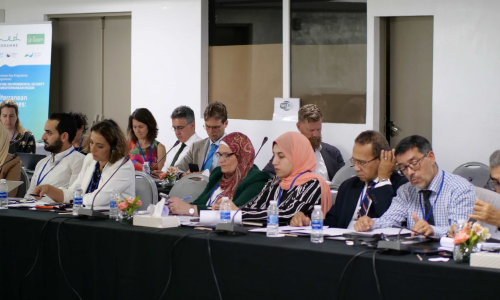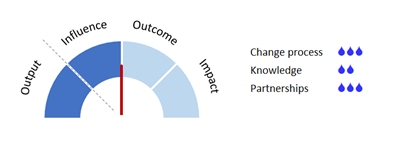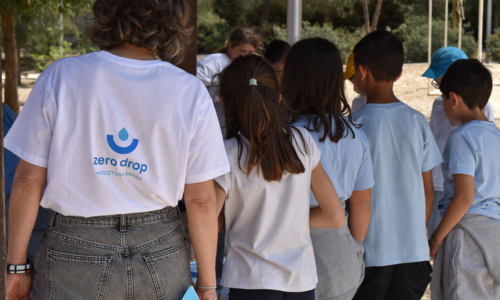Regional impact
From source-to-sea: progressing water−energy−food−ecosystems nexus management

In the Mediterranean region, there is a need to advance capacity for implementing sustainable natural resource management practices and more skillfully navigating conflicts between crucial economic sectors. In response, the inaugural Regional Water−Energy−Food−Ecosystems (WEFE) Nexus Roundtable in the Mediterranean was hosted in Morocco in June 2023 and convened 160 high-level participants from 15 countries. (“Nexus” is the nickname we use to refer these complex interconnections, which are increasingly important to understand and act on if we aim to make real progress towards water security.)
The summit was organised by GWP Mediterranean and the European Union-funded Water and Environment Support project, within the framework of the Global Environment Facility and Mediterranean Action Plan of the UN Environment Programme’s Mediterranean Sea Programme and with Sida support, on the joint initiative of the Union for the Mediterranean, Barcelona Convention, and the European Union. It provided a forum for representatives of national authorities, WEFE stakeholders, and institutions from across the region to collectively acknowledge the urgent need for a new strategic framework for natural resource management.
Following the summit, GWP Mediterranean – with the support of the Global Environment Facility-funded MedProgramme – and partners initiated the preparation of a WEFE nexus strategy in the Mediterranean source-to-sea continuum, while also leading a WEFE nexus dialogue process incorporating technical assessments, action plans, and investment guidance to advance progress at the national level in several Mediterranean countries.
In Lebanon, GWP Mediterranean provided support using GEF MedProgramme resources to create a WEFE Inter-Ministerial Group spearheaded by the country’s Ministry of Energy and Water, to encourage integrated solutions for governing and managing shared natural resources. A field visit to Lebanon’s Shouf region, organised by GWP Mediterranean in December 2023, brought together members of nine different government institutions to observe nexus solutions in action, underscoring the positive impact that such interventions can have and bringing these projects from concept to reality.
“Usually we talk about the nexus in theory, but here we saw it,” said Eng. Mona Fakih, Director of Water with Lebanon’s Ministry of Energy and Water. “It can be a starting point to elaborate and integrate it in our strategies and move from small to bigger projects.”

Strengthening water security for farmers in Crete
As a hub of agricultural production and a popular tourist destination, the island of Crete, Greece, has struggled with chronic water scarcity. Over the years, Crete’s water security challenges have been exacerbated by antiquated water infrastructure, which has contributed to significant water losses.

In response, GWP Mediterranean collaborated with the municipality of Heraklion in 2023 to create and implement the Zero Drop water resources protection programme to strengthen water security in rural communities. With funding from the Coca-Cola Foundation, the initiative revolved around a multi-faceted technical intervention that upgraded irrigation piping used to deliver treated wastewater to farms, reduced farmers’ reliance on groundwater, and improved equipment at two major pumping stations to save both water and energy. Zero Drop also facilitated the installation of solar-powered remote-controlled infrastructure for transferring, collecting, and distributing irrigation water in certain target communities.
Generating estimated water savings of 14.5 million litres of water annually, Zero Drop’s impact has been exceptional, garnering glowing media coverage on Greek television. To ensure the initiative’s durability going forward and generate widespread community support, the Zero Drop programme also engaged students at local schools with training on sustainable water management, including through a “snakes and ladders” game, and hosted a workshop to introduce farmers to water-saving irrigation technologies.

Advancing action plans on all sides of the Mediterranean
Across the region, integrated water resources management (IWRM) action plans generated substantial forward momentum in 2023 thanks to support from GWP Mediterranean.
In North Macedonia, the government finalised and approved a landmark nationwide IWRM Action Plan to coincide with World Water Day 2023. The achievement concluded a 10-month consultation process facilitated by GWP Mediterranean, during which the country’s Ministry of Environment and Physical Planning helped identify institutional, legislative, and technical challenges and crafted appropriate responses with backing from GWP’s SDG 6 IWRM Support Programme. The Ministry of Environment and Physical Planning also received wide-ranging buy-in for the Action Plan after presenting it to line ministries, scientific and public institutions, and non-governmental organisations.
“With the validation of the IWRM Action Plan, which is in accordance with the existing national framework and legislation for the management of water resources, we are accelerating the development of the national strategies and the general climate action, as well as realisation of the Sustainable Development Goal 6 in the country,” said North Macedonia’s Deputy Minister of Environment and Physical Planning, Ms Hristina Odzaklievska.
Meanwhile, Tunisia achieved a parallel milestone as the country continued its pursuit of Sustainable Development Goal 6.5.1. Following a sustained national dialogue from June 2022 to March 2023, led by Tunisia’s Water Resources Department and facilitated by GWP Mediterranean, the country validated a new IWRM plan prioritising inclusivity and accountability, as it incorporated a monitoring and evaluation system with gender-specific indicators for water policy and an analysis of social dynamics related to water use.

